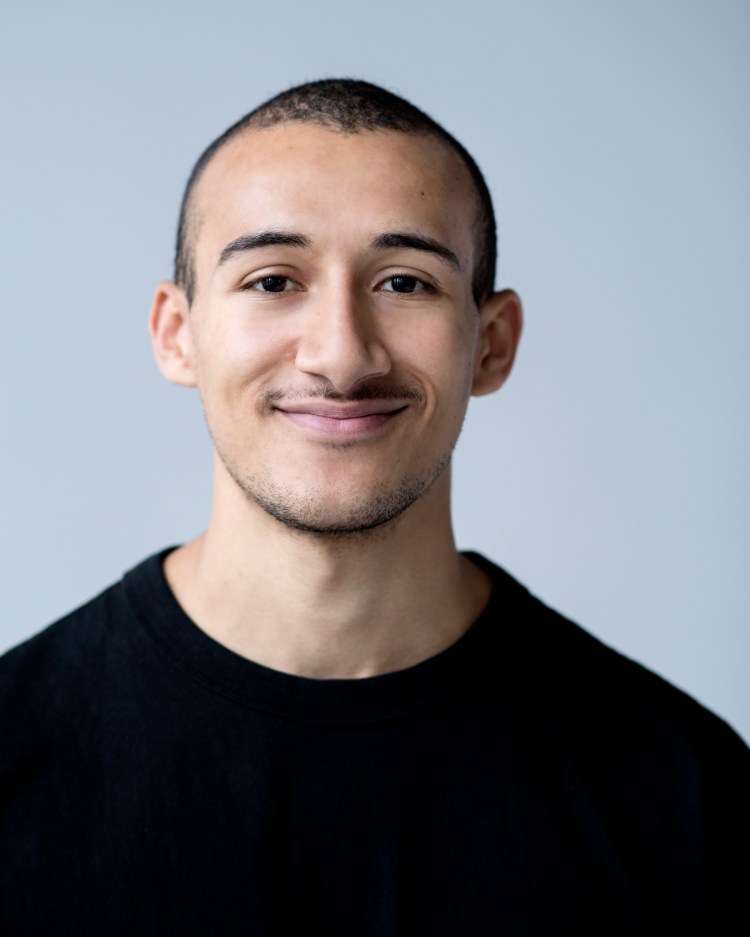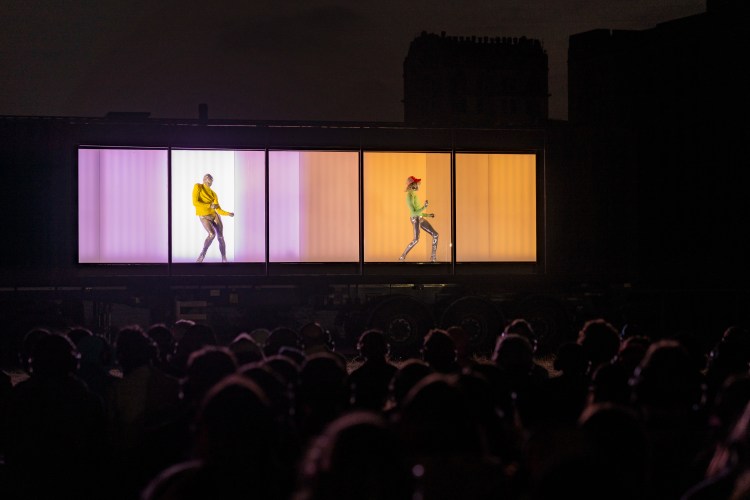
The Fame Reporter interviewed London-based performer Ruben Brown starring in the dance spectacular Future Cargo in its Australian Premiere playing at Adelaide Fringe Festival from 16 Feb – 17 March.
Future Cargo is an homage to a past and a future where contact seems all too possible. It’s the acclaimed outdoor show by Frauke Requardt & David Rosenberg and combines large-scale spectacle with surprising intimacy in a sci-fi dance phenomenon performed under the stars, where audiences wear headphones to connect them to the strange world and events inside the truck.
London-based Ruben Brown completed professional training at The London Contemporary Dance School, and his first professional job after graduating was with Requardt & Rosenberg in their production Dead Club. He has since worked in Brussels for Compagnie THOR before working on projects further afield in the United States and South Korea.
We had the fantastic opportunity to sit down with Dance Captain Ruben Brown in the global hit, Future Cargo, his love for the creative process of the show, dancing all around the world and more.
Welcome to The Fame Reporter Ruben, what sparked your interest in performing initially?
My secondary school was an arts college so all arts were compulsory for the first three years. Dance seemed to be something very natural and fun that I took to with ease. After a couple of years I wanted to pursue something more rigorous and started pre-professional training in my teens.

Can you tell us about your journey in the world of contemporary dance, from your training at The London Contemporary Dance School to your work with Requardt & Rosenberg and beyond? How did your experiences shape your approach to dance?
I had an amazing three years training at London Contemporary! Just before graduating, I auditioned for Requardt & Rosenberg and landed the job for “Dead Club.” It was an amazing kickstart to my career.
Soon after that I moved to Belgium to work for a company and everything snowballed from then onwards. That’s not to say it’s been rosy the whole time. Our industry is a tough one and there are many challenges within that both personally and professionally. The pandemic also had a massive impact on that. From everything I’ve experienced so far, the one thing that remains steady for me is that whatever production/ project I may be part of, the integral factor I treasure is who I’m working with.
I have some pretty incredible friends and colleagues and that is the most special part of our profession.

“FUTURE CARGO” is described as a sci-fi dance phenomenon. Could you share some insights into the creative process behind the show and how the team from DARKFIELD approached this unique blend of science fiction and dance?
FUTURE CARGO is Requardt & Rosenberg’s COVID creation. The creative process was very long because of the pandemic and its format had to change with safety measures in mind. Somehow, I think having those limitations helped craft the work into something much more meaningful. We spent a lot of time playing with what could be achieved on a giant treadmill!

As a dancer who has worked internationally in places like Brussels, the United States, and South Korea, how have different cultural influences impacted your artistic expression and the way you approach your performances?
It’s always amazing to experience different cultures and ways of working with dance. Getting to work internationally definitely broadens your exposure to different skill sets and aesthetic flavours. The biggest impression it leaves on you is how adaptable you can be but at the same time, how similarly we all work and how tightly-knit our community of dancers is worldwide.
Having been a part of productions like “Dead Club” with Requardt & Rosenberg, how does “FUTURE CARGO” differ in terms of its creative challenges and the themes it explores?
The work of Requardt & Rosenberg will always include fabulous costume and set design, great sound construction and strong elements of surrealism. FUTURE CARGO itself creatively differs in the way it demands absolute precision in timing and synchronicity. The margin for error is very small and in terms of performance, the way to truly convey its meaning is caught somewhere between mundane human experience and unknowing alien neutrality.
Themes explored in this work centre around existentialism; what is it to relate to people and objects, what is it to understand you will not last forever, what do you do when everything you know changes around you?

“FUTURE CARGO” is making its Australian premiere at Adelaide Fringe in 2024. How does it feel to bring this critically acclaimed sci-fi dance production to a new audience, and what can viewers expect from the show?
It’s always exciting and I know you’re going to love it! I think this show is a feast for the senses and is very stimulating. It’s almost as if Wes Anderson made an adaptation of Blade Runner. Picture that and that’s what you can expect from the show.
In your career, you’ve worked with various choreographers and companies. How did your collaboration with the team behind DARKFIELD, known for their immersive experiences, contribute to the unique nature of “FUTURE CARGO”?
David Rosenberg (the Rosenberg half of R&R) is one of the co-creators of DARKFIELD. Funnily enough I had no idea of his work with DARKFIELD until recently. In some ways, DARKFIELD feels very familiar to me as I have worked with David for many years.

FUTURE CARGO has been an established production for years but David has definitely added some DARKFIELD flavour to it; it’s refreshing to see this show continue to evolve through the years.
The intersection of technology and dance is a fascinating aspect of “FUTURE CARGO.” Can you share how technology is incorporated into the performance, and what challenges or opportunities it presents for both the dancers and the audience?
It’s all about the tech in this show! We have a system that syncs two different soundtracks: one for the audience and one for the performers. Those soundtracks are also synced up to our lighting programme and all of that is dependent on varying speed changes on a travellator.
What’s great about all of this technology is that we can communicate freely during the show whilst delivering an outstanding performance.
Unfortunately, when something delays or stops working, the whole show gets thrown into a dilemma. That being said, we always manage to deliver.
Could you highlight any specific themes or messages that “FUTURE CARGO” explores, and how these themes resonate with contemporary audiences?
I think at the heart of the show, it’s all about feeling and how we all relate to ourselves, to one another and the world we inhabit.
The show is so visually striking but for the audience there’s a lot of subtleties, loaded with emotion from the mundane, that really makes for a cathartic response.

What 3 performers dead or alive would you love to have a dinner party with?
Maguy Marin, Mats Ek and Boris Charmatz.
Finally, looking ahead, do you have any future projects or aspirations you’d like to share?
Nothing too exciting! I pretty much took 2 months out of my life to come to Australia for FUTURE CARGO so it’s back to the grey skies of London for the ever-challenging and interesting freelance life of a dance artist. Who knows what will come up…
Fame Reporter Word Play
Future Cargo
And a 1 and a 2 and a 3 and a 4
Favourite style of dance
Contemporary, duh!
Place you want to travel to
Jamaica
Adelaide Fringe
Far out
Dream Co-star to work with
I’d love to dance for Sasha Waltz!
TV Binge
Derry Girls
Finally, favourite thing about performing
The people I share the stage with
Thank you for being our guest Ruben and chookas for your Australian run of Future Cargo.
TICKETS
Playing from Fri, 16 February – Sun, 17 March
The Fame Reporter Social Media
YouTube
Instagram
Twitter
Facebook
All photos and videos – Supplied
